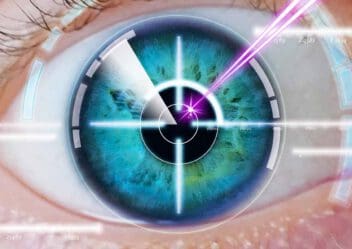
Medically Reviewed by Angelique J. Pillar, M.D.
Further Reading
What to Expect After Cataract Surgery: Dealing With Light Sensitivity, Protecting Your Eyes & More
Home / Guide to Cataract Surgery /
Last Updated:

Medically Reviewed by Angelique J. Pillar, M.D.
The day of your cataract surgery, your eyes may feel itchy and gritty, so rest is vital. After surgery, there are certain activities to avoid in order to let your eye heal properly. Avoid swimming, driving, makeup, and strenuous exercise until your doctor clears you to do so.
Table of Contents
The week after your surgery, your vision may remain a bit blurred. You can speed recovery by avoiding grit, water, and contamination.
After a month, you may have crisp vision, but your eye is still healing and you will still need to follow your doctor’s orders. After eight weeks, your healing is complete. You may experience even more benefits with time, as your eye adjusts to crisp vision.
The Day of Surgery: How to Protect Your Eye

During cataract surgery, the blurred lens that keeps you from crisp vision will be replaced with a new lens. The entire procedure does not take long to complete, but it can be disruptive to your body. When your body is disrupted, you tend to feel either pain or discomfort until healing takes hold. According to the Royal College of Surgeons, your eye may itch and you may feel as though there is grit or dirt between the edge of your eye and your eyelid. These symptoms can be uncomfortable, and you may be tempted to rub or dig at your eyes to make the sensation stop.
It is vital for you to keep your hands away from your eye during this first day of healing. Your doctor will send you home with drops that can ease discomfort, and if you find that you are still tempted to touch your eyes, wearing the shield your doctor gave you can remind you to keep your fingers away. You should wear that shield at night too.
You deserve clear vision. We can help.
With 135+ locations and over 2.5 million procedures performed, our board-certified eye surgeons deliver results you can trust. Your journey to better vision starts here.
What to Do When You Get Home
After cataract surgery, you will be able to go home once you feel all right. This is generally within an hour or two following surgery. You’ll need a family member or friend to drive you home.
Once at home, it’s recommended that you take a nap and rest for the remainder of the day.
You are free to eat and drink as you normally would after cataract surgery. If you feel nauseated, slowly sip fluids before progressing to larger meals.
You can bathe or shower the day after cataract surgery. Just take care to keep shampoo, soap, and water out of your eye.
Know that discomfort is very common in those who have cataract surgery. In fact, in a study published in the journal Acta Ophthalmologica, researchers found that up to 52 percent of people had symptoms such as burning, itchiness, and weeping eyes after surgery. These symptoms pass, but you should prepare to rest the day of your surgery rather than trying to work or socialize.
The American Optometric Association also recommends avoiding bending at the waist to pick up objects on the floor during early recovery. Your body has been through a surgical procedure, and you will need rest. Avoiding lifting, per your doctor’s instructions, can help you achieve a speedy recovery.
The Week After Surgery: Your Eye Still Needs Care
You will usually see your eye doctor a day or two after cataract surgery. At NVISION, we offer the highest quality of care. Our doctors will ensure your eye is healing as it should be following surgery.
Your doctor will continue to monitor your recovery, and you may have several appointments during the early days of your recovery. Within a week of surgery, your vision may remain a bit blurred, but if you can pass visual acuity tests, you may be cleared to drive. You will still need to take special precautions to help your eye heal successfully.
The American Refractive Surgery Council reports that some sources of water, including hot tubs and pools, may contain contaminants that can cause an infection in your healing eye. As a result, you should avoid spending time in any body of water, including lakes and rivers, until your doctor tells you it is safe to do so.
Your eye main remain a bit itchy and sensitive, and you can reduce those symptoms by steering clear of additional sources of irritation, such as:
- Eyeliner
- Mascara
- Eye shadow
- Eyelid creams
- Dusty environments
- Windy conditions
Your eyes may feel a bit more comfortable with each passing day, and your doctor will help to manage any symptoms you might feel. As the Review of Optometry points out, recovery from cataract surgery is an individual process. While some people recover quickly, others need a bit more time to heal. Your doctor may continue to use medicated eye drops to help your eye heal, and you may have oral medications to help with pain.
During the first week of recovery, your eye may continue to water excessively. Tears help to nourish and protect the surface of the eye, and your body may produce more tears in an effort to help the eye to heal. If those excess tears make your eye or face feel sticky or tacky, cleaning your eye may help.
NHS recommends using water that has been boiled and then cooled for this process rather than plain tap water. You can dip gauze into that water, and wipe your eye from the inside corner to the outside lid with a soft brushing motion. Avoid pressing into your eye as you wash. Instead, gently wipe away any excess moisture that sits on the outside of your eyelid.
You deserve clear vision. We can help.
With 135+ locations and over 2.5 million procedures performed, our board-certified eye surgeons deliver results you can trust. Your journey to better vision starts here.
The Month After Surgery: More Protection Is Needed
Within a month of your surgery, the pain and discomfort you once felt should be less acute. Your eye has started to heal from the trauma of surgery, and sensations of pain and burning may be fading as a result. That does not mean that your eye does not need continued protection.

Your doctor may ask you to continue to use eye drops during this time period, and it may remain unsafe for you to expose your eye to contaminated water, dust, or debris.
You need to see your doctor regularly during this time period, so your doctor can monitor your recovery and advise you if something is amiss. You’ll generally see your doctor for another follow-up appointment one to two weeks following cataract surgery.
The American Academy of Ophthalmology reports that some swelling can persist in the months after surgery, and that swelling can make your vision seem blurred. In most cases, that swelling will resolve as the eye heals. But your doctor will continue to test your vision and offer help if it does not clear.
Once your vision has stabilized and is clear, you may need glasses. In fact, most people need glasses after cataract surgery, although not everyone needs to wear glasses all the time. Your doctor can provide you with an appropriate prescription once you are no longer experiencing vision changes. You may be able to undergo vision tests for prescription glasses at the one-month mark.
8 Weeks After Surgery: Healing Is Complete
The American Refractive Surgery Council reports that most people are considered healed from cataract surgery within eight weeks. At that time, you may talk with your doctor about scheduling surgery on your other eye, so you can have crisp vision in both eyes at the same time. It may be uncomfortable for you to tackle most tasks now, when you can see clearly out of one eye but not the other.
At NVISION, we’ll usually see you for another follow-up at this point to ensure your eye has healed as expected.
Expect More Benefits as Time Passes

After your eyes have healed, you can expect vision that is not clouded by cataracts. You may experience even more benefits as you adjust to your newfound visual abilities.
For example, in a study published by The Lancet, researchers found that people who underwent cataract surgery were able to reverse cognitive changes caused by poor vision. In other words, people who had this kind of surgery were able to experience a boost in brain power due to their ability to truly connect with the world around them. You may be able to see things you’ve missed out on for years, and that could spur you on to a greater connection with your community and your world.
The Risks of Doing Too Much Too Soon
If you don’t follow your doctor’s aftercare instructions well or start to do too much too soon following surgery, you risk developing complications related to the eye, explains AAO. Risks associated with cataract surgery include:
- Infection of the eye.
- Retina swelling.
- Bleeding in the eye.
- Swelling of the eye.
- Detached retina.
- Injury to other parts of the eye.
- Blurred vision.
- Visual issues, like seeing halos, glare, or dark shadows.
- Vision loss
- Implants that may move out of position.
Prior to surgery, your ophthalmologist will address the risks and benefits of surgery with you and what you can do to optimize your eye health and surgery outcomes. Recovery from cataract surgery is relatively quick, and diligent aftercare can help improve recovery time and positive results.
While it can be tempting to attempt to accelerate the recovery process, this isn’t wise. Your surgeon will clearly outline what you can and can’t do after cataract surgery, and it’s important to follow these instructions closely to ensure the most complete healing process.
What to Do Next
Only a doctor can diagnose a cataract, and your doctor plays a big role in your healing process. Your doctor can help you choose the right lens to replace the clouded one in your eye, your doctor will perform the surgery that restores your vision, and your doctor can guide your recovery.
Work with a doctor you can trust. At NVISION, we can connect you with skilled surgeons who can perform the quality surgery you deserve, and our doctors are exceptional communicators that can explain your options clearly and quickly, so you can make the right decision for your eyes and your life. We can connect you with a doctor in your area. Just contact us to find out more.
You deserve clear vision. We can help.
With 135+ locations and over 2.5 million procedures performed, our board-certified eye surgeons deliver results you can trust. Your journey to better vision starts here.
References
- Recovery Tracker: Helping You to Make a Speedy Recovery After Cataract Surgery. Royal College of Surgeons.
- Recovery After Cataract Surgery. (April 2016). Acta Ophthalmologica.
- Cataract Surgery. American Optometric Association.
- Questions to Ask Your Surgeon About Cataract Surgery Recovery. (June 2017). American Refractive Surgery Council.
- An OD’s Guide to Postoperative Cataract Care: Practical Advice for Both Routine and Complex Cases. (December 2017). Review of Optometry.
- Recovery: Cataract Surgery. (December 2017). NHS.
- How Long Does it Take to Recover Full Vision After Cataract Surgery? (August 2015). American Academy of Ophthalmology.
- Cataract Surgery. (March 2018). Mayo Clinic.
- Visual Restoration After Cataract Surgery Promotes Functional and Structural Brain Recovery. (April 2018). The Lancet.

Angelique J. Pillar, MD is a fellowship trained and board certified ophthalmologist specializing in cataract, cornea, and refractive surgery.
This content is for informational purposes only. It may have been reviewed by a licensed physician, but is not intended to serve as a substitute for professional medical advice. Always consult your healthcare provider with any health concerns. For more, read our Privacy Policy and Editorial Policy.